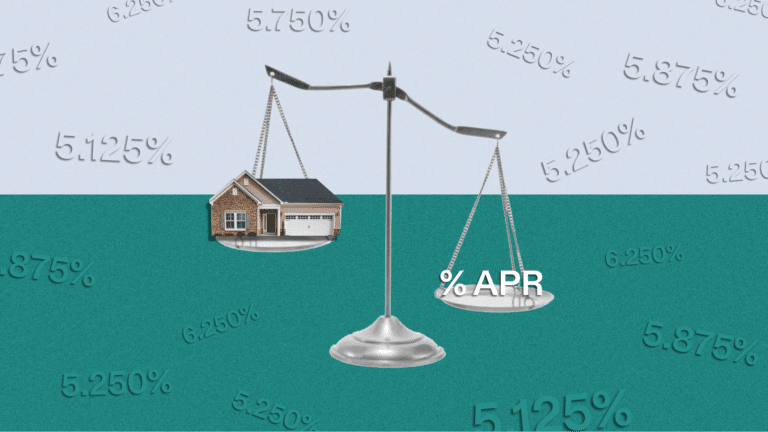Saving for retirement is important for your future.
But for people hoping to buy a home soon, watching the balances on their retirement accounts grow while trying to come up with a down payment can be a little frustrating. Why can’t I just use the money I’ve saved for retirement to buy a house? A home can also be a pretty solid investment in your future, after all. Homes can appreciate in value over time. Plus, if you buy a home, you’ll have a place to live. You can’t live in your 401(k).
Unfortunately, cashing out retirement funds for anything other than retirement can have some pretty significant downsides. Thinking about tapping into your retirement assets to buy a home? Here’s what you need to consider first.
Can You Use Retirement Funds for a Down Payment?

So, the first question: can you use retirement funds for a down payment? The very short answer is yes. You can tap into your retirement savings and use the proceeds to make a down payment.
If you’ve got funds in your retirement accounts, liquidating your retirement assets is an option. People do it. At the end of the day, it is your money. You can do with it what you’d like.
That said, and this is important: just because you can do something doesn’t mean you should.
Pulling retirement funds out early can be very costly.
Trading retirement savings for cash now is sort of like letting your cousin write your Tinder bio. Or wolfing down an entire pizza before hopping on a roller coaster.
Fine, fine, fine. I get it. What kind of consequences are we talking about, really?
The exact repercussions of taking retirement savings for a down payment will vary depending on where you’ve currently got your retirement savings parked. We’ll cover IRAs and Roth IRAs, which have special provisions for would be homeowners; and 401(k)s, which don’t, but may still have your best I-need-the-cash option.
Withdrawing Funds from an IRA

If you’re a first-time homebuyer with an IRA, you are allowed to withdraw up to $10,000 to purchase a primary residence without paying the standard 10% early withdrawal penalty.
(Fun fact: if you haven’t owned a home in the last two years, then you can count as a first-time homebuyer, even if you’ve owned a home at some point in a past.)
Since IRAs allow pre-tax contributions, you’ll have to pay taxes on anything you withdraw. There are limits on the amount of money you can put into an IRA each year. Currently, that limit is $5,500, or $6,500 if you’re over 50. So if you withdraw the money early, you can’t just put the money back in later. You’ll lose out on all the potential returns that money could have earned if you’d left it alone.
What about a Roth IRA?
![]()
If you have a Roth IRA, then you have already paid taxes on the funds you contributed. That means you can withdraw any funds you’ve put into your Roth IRA whenever you’d like, without paying any extra taxes. With a Roth IRA, if it’s money you put in, you can take it back out. But before you empty your Roth IRA for your down payment: there are limits on taking out earnings or interest that you’ve managed to accumulate on your contributions.
Similar to a traditional IRA, first-time homebuyers are allowed to withdraw up to $10,000 in earnings without a tax penalty if you’ll be using the money to purchase a primary residence. After that, any additional earnings withdrawn would be taxed at your usual marginal tax rate.
And just like a traditional IRA, there are yearly limits on how much you can put into a Roth IRA, which means the money you withdraw now can’t just go back into your account later. Withdrawing those funds now means you’ll be forfeiting any potential interest and future earnings you could have made with that money for the next few decades.
Taking Money from Your 401(k)

The rules for accessing funds in a 401(k) are different than the rules for accessing the funds in an IRA or a Roth IRA. The most important difference for a homebuyer to know? Unlike an IRA, there is no special first-time homebuyer accommodation for withdrawing 401(k) money.
Any early withdrawal from a 401(k) comes with some pretty nasty penalties. First, you could lose any unvested employer contributions. There’s an automatic 10% early withdrawal penalty if you’re under 59 and a half years old. (Your plan administrators might have their own cash out penalty fees as well.) And you’ll have to pay taxes on whatever you withdraw.
After all the fees and penalties for early withdrawal, the actual amount of cash you can use for a down payment might be significantly less than the amount printed on your quarterly statement. So keep that in mind.
Instead of Withdrawing the Money, Consider Borrowing

If you absolutely must use funds from your 401(k) for your down payment: the IRS allows individuals to ’borrow’ up to half of the vested balance in their 401(k) accounts, up to $50,000. (This option isn’t available for IRA holders. It’s just for employer-sponsored retirement plans.)
Now, borrowing funds from your 401(k) isn’t without drawbacks. The loan term is pretty short, usually five years: so you’ve got to pay the money back quickly, with interest. (Technically, you’re paying yourself back. So instead of paying interest to a bank, you’re paying the interest to yourself, which is nice.)
Your mortgage lender will also count the monthly required payment back to your 401(k) like any other debt obligation, so a high monthly payment due to your 401(k) could negatively impact your debt to income ratio and your potential mortgage eligibility.
And if that isn’t enough, borrowing from your 401(k) is risky if you don’t have rock solid job security. If you lose your job or change employers while you’re paying the loan back, you will be required to return all of the money at once, usually within 60 or 90 days of changing employers. Otherwise, your loan becomes a withdrawal, and you’ll be stuck paying taxes and penalties on the amount you borrowed.
Borrowing from your 401(k) is a short-term solution, at best. And it’s not without costs or risk. Still, of all the ways you could potentially use funds earmarked for retirement to help you buy a home, a loan from your 401(k) could give you access to funds without derailing your retirement plans entirely. Also worth noting: while the IRS allows borrowing from your 401(k), your plan administrators may have more stringent limits than the allowable IRS guidelines. If you’re considering borrowing from your 401(k), make sure your plan allows it and that you understand all of the details before you go through with it.
Got all that? If you’re interested in exploring other strategies for saving up for a down payment, we’ve got you covered.






